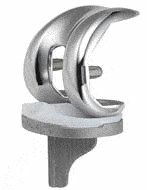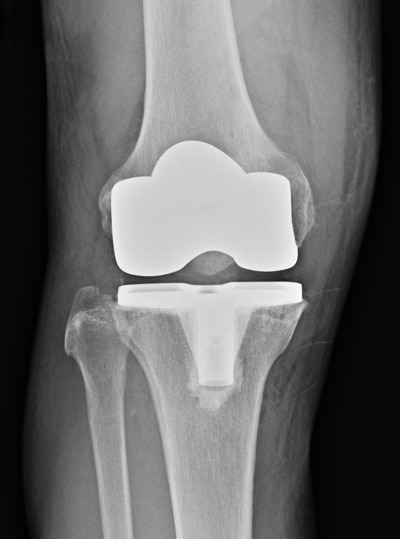Total knee replacement (TKR)
Total knee replacement involves an incision in the front of the knee, removal of all the damaged bone and cartilage surfaces from the thigh bone (femur) and leg bone (tibia). A metal artificial knee joint (usually made of a cobalt-chrome alloy) is cemented into position to replace the bone surfaces. A piece of polymer plastic is inserted between the two metal surfaces to provide for a smooth articulated joint.
Patients usually can start to walk the day after surgery, with the aid of a walking frame, and they stay in hospital for 4-6 days. Most can walk with a walking stick by about 1-2 months after surgery. Success rates of TKR are between 90-95%. The artificial joint implants can last for many years. 10 years after surgery only about 5% of patients need to have a repeat knee surgery. 20 years after surgery, more than 80% of patients are still walking on their original total knee replacement.


Unicompartmental knee replacement (UKR)
Sometimes, only half of the knee is affected by arthritis. In these cases, only the diseased compartment needs to be replaced. The operation has the advantage of a smaller scar, and faster recovery times.
"Uni" implants unfortunately do have a slightly higher chance of wearing out faster. In older patients with lower physical demands, UKRs have an 85-90% chance of lasting 10 years. As such, a detailed discussion with your surgeon of the pros and cons of UKR versus a TKR is recommended.
While UKR sounds like a much better solution than TKR, the reality is that based on the need for the rest of the knee cartilage to be normal, less than 5-10% of all knee arthritis patients are actually suitable for a UKR, and most patients still need to under TKR to treat their pain
UKRs are also increasingly used in younger patients who would otherwise be undergoing osteotomy. Recent studies on patients after either osteotomy or UKR show that the need for a second operation (usually a TKR) within the first 5 years is less when a UKR is carried out.
